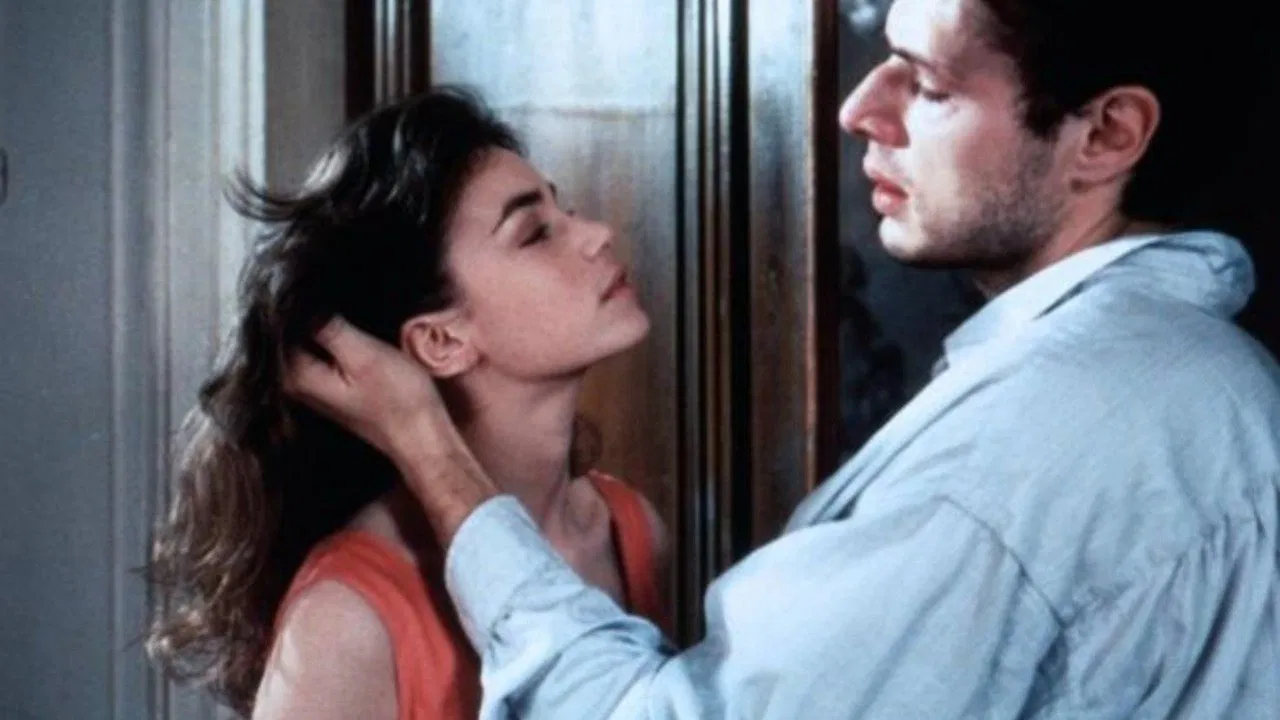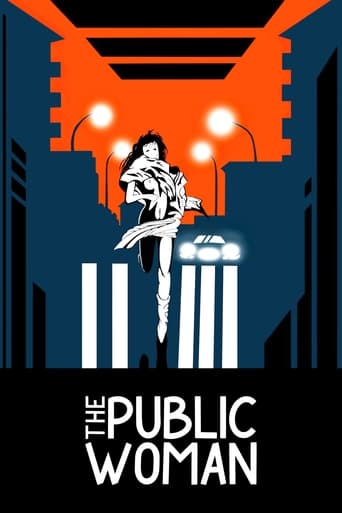

The 5th feature from the late Polish director Andrzej Zulawski (1940-2016), THE PUBLIC WOMAN is a French production, starring Valérie Kaprisky as a young girl Ethel, who has been chosen by the film director Lucas Kessling (Huster), a Czech immigrant, to star in his movie adaptation of Dostoyevsky's novel "THE POSSESSED, aka. DEMONS", which is shot in Paris.Ethel has no acting experience, it is her raw sexual appeal turns on the egoistic Lucas, he hooks up with her but finds her lacking in dramatisation and articulation of her character during the filmmaking, which itself is a constant jag of kerfuffle and chaos. Zulawski engages a freewheeling style to the angles of frame, which is navigated with ingenious dexterity by the legendary cinematographer Sacha Vierny, and he proffers us a close look of the process of making film in a crammed set, with slickly choreographed mobility and a hammy cast aggravated by heavy cosmetics.After mounting a humiliating remonstration on Ethel for her incompetence, Lucas fires her and the narrative shifts from the sadomasochistic relationship between them to a new chapter, when Elena (Delor), a Czech actress, one of Lucas' mistress, goes missing, Ethel implausibly takes the imposture as Elena and plunges herself into a steamy relationship with Elena's husband Milan Mliska (Wilson), a frail, self-abusing (glass-chewing) young man who later will be involved into a political assassin of a Lithuanian cardinal and is hunted; thereafter, Lucas decides to re-hire Ethel for the role and she is sandwiched between him and Milan, both are driven mad by petit jealousy until one of them is forever out of the picture, and Ethel will finally triumph with a tour-de-force to show that an "actress" is born.Being an art-house endeavour, nudity (notoriously for Ethel's two naked dancing sequences) and explicit sex scenes are indispensable here, which even leave a bitter taste of gratuitous exploitation; and we can clearly see the dummy in the sole car chasing set piece, a telling proof that commercial cinema is not such an easy piece of pie to emulate. But Kaprisky emotes beautifully from the taxing requirements her role entails, both physically and mentally; a blond Huster, with a haunting resemblance of a less delicate Farley Granger, is unwaveringly committed, but sometimes he is overbearingly tiresome; last but not the least, a young Wilson establishes himself in his early career that he can be madly charming and charmingly mad simultaneously.Concocted with a little political allusion, a fairly firm buttress of female-empowerment under the patriarchal repression, an excessive amount of exotica and a largely madcap storyline, THE PUBLIC WOMAN does not give full justice to Zulawski's talent, although it will stay with you for its convivial self-awareness of its subject as the cast takes a bow in the last scene, it is a theatrical farce, but done with a certain degree of flourish.
... View MoreI love this guy, this madman and anarchist of cinema. I love him for the reasons he seems to vex a lot of people; muddled screenplays is the frequent complaint, hard to understand, extreme in everything he does. It is simply a matter of approach. In ordinary films, the filmmaker presents a more or less conventionally understood reality, and asks of us to penetrate behind the words and masks of people hiding their true selves, to get to something essential of emotions and dynamics. We infer from a subtle gesture, from a meaningful look.Zulawski's method is one of shattering the clean boundaries of roles and framed narrative, all the things that keep us at arm's length from ever really feeling the soul of a character in our skin, doing so with impunity, so that we are free to swim and see into the inner world of urges and emotional thought, pure mindstream. What you would normally have to infer is up there on the screen. The skin of consciousness has been turned inside out, reversed: the pedantic details of all this having linear sense and plot are now beyond our reach, the actual battered soul is visible.This is nothing to scoff at, in fact it is the most advanced dimension in film. Reversed innerseeing. Ecstatically hovering out of self and story. It is what Lynch only accomplished with Inland Empire, acknowledging the Polish influence.Possession is sublime, the pure convulsing horror of a soul being torn apart. It was out of this world, everyone from Cronenberg to Lynch sat down and took notice. The story goes that he was so hellbent on that film to coax the raw emotion he wanted out of Isabelle Adjani, he did some pretty horrible things to her. Here is the followup to that: an obsessive, half-mad filmmaker (ex-pat working in France) torments his young starlet on the artistic journey to perfection. Their film is an adaptation of Dostoyevski's The Possessed (wink). She is eager, talented, but the murky depths of his vision escape her.Everything else is madness, flailing, fluid self, the exposing of raw nerves in the frantic experience of the mindstream.This seems murkier than Possession, because it lacks the actual monster and clean symmetry of doubles. It's in the same vein. Forces in these people are so painful and overwhelming, the characters have splintered into several more selves, and each splintered self is maniacally pushing against the limits of his narrative - some of them inside the play, others in separate subplots. Two ex-pats, frustrated in Paris with the hypocrisy of art and religion - one of the murders a cardinal, both are present in the scene, both photographed in a film-within. Two actresses, both mistresses of the same two guys.So he is angrier than Tarkovsky. Has none of Malick's piousness. Ruiz and Wojciech Has are playful, he is bitter and mad. He sees ugliness, sin, impurity. And he has several rough spots, of symmetry and politicking, both shouted.But he worships the same awesome god: not the cardinals' god, but the recognition of something that goes beyond the small limits of reason and self, and tries to awaken the vastness of that in his own narratives of fluid and battered egos.And he has trusted collaborators on the journey. Valerie Kaprisky is divine, ecstatic dancer to the mystery of shedding skin.Sacha Vierny, that mage of cinematic light; Resnais, Greenaway, Ruiz, Zulawski, he has enriched all four with his eye.And if all of that seems gibberish to you, you should know of the rich tradition of Buddhist gurus called mahasiddhas, who used madness and gibberish as a tool for wisdom. A similar notion of desired irrationality is encountered from Zen to Dada.The thinking mind is a meddlesome monkey. Confound, confound, confound. Something to meditate upon.
... View MoreI am prompted to write this user review by the ghastly unhelpful two previous reviews here, which do not do the movie a single jot of justice. One wonders why they have bothered to comment, when it seems they have not even seen the movie in a language they can understand.Naked dancing will of course attract some (in this case, well-deserved) attention, but my impression of the movie was that the whole "public woman" theme is actually the least explored of multiple other themes in the movie. The movie is about movie-making, and in turn about the difference between cinema and reality, meaningfully underscoring its point by being excessively melodramatic in its movie-within-the-movie bits (incl. the opening sequence). It is not a movie for obtuse audiences. The movie being made inside the movie is an adaptation of Dostoyevski's "The Possessed", which I am certain it will help to have read, although it is really being chewed up to an over-the-top degree here.The Czech guy (played by Lambert Wilson of Matrix fame) is a snitch who has reported his dissident friends to the communist authorities, and subsequently become an assassin for them - one they intend to use as a "lone nut" scapegoat in getting rid of a Lithuanian cardinal who's getting too popular. This being Zulawski's account of his own role as a rising star in communist Poland, and what he imagines the authorities want to do to him (which is why he transferred his career to France).This is a complex and unique movie which will stimulate and challenge intelligent viewers. The rest will simply be confused.9 out of 10.
... View MoreIt's a real shame that this movie has a such confused screen-play. We are acquainted to non-linear plots, but this one exceeds. Probably this is because the director himself performed as a screen writer, and so we often see shots that have a strong visual impact, and are tecnically impressive, but whose function within the storyline is unnecessary and confusing. So many elements remain undetailed, for instance Ethel's relationship with her parents and the underlying political conspiracy. And the mysterious bohemienne writer that appears twice in the movie... who is? And how comes that he is part of Ethel's background? At a certain point you ask yourself what is going on and what the movie is all about.Editing is not always faultless, and there is some rough cut.Coming to the bright side, as I noted above there are good shots, both for directing and for acting that is really good by all actors. Valerie Kaprisky who was then 22 old, appears gorgeous and dramatic at the same time. Huster and Lambert also play their parts convincingly.Rating: *** (out of six)
... View More